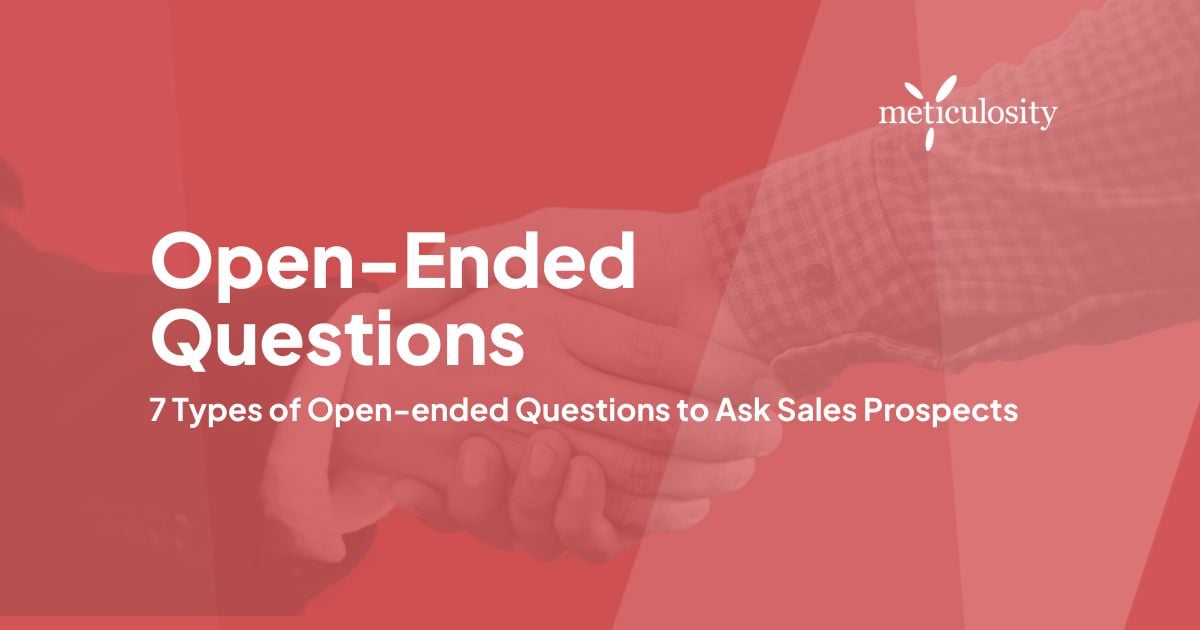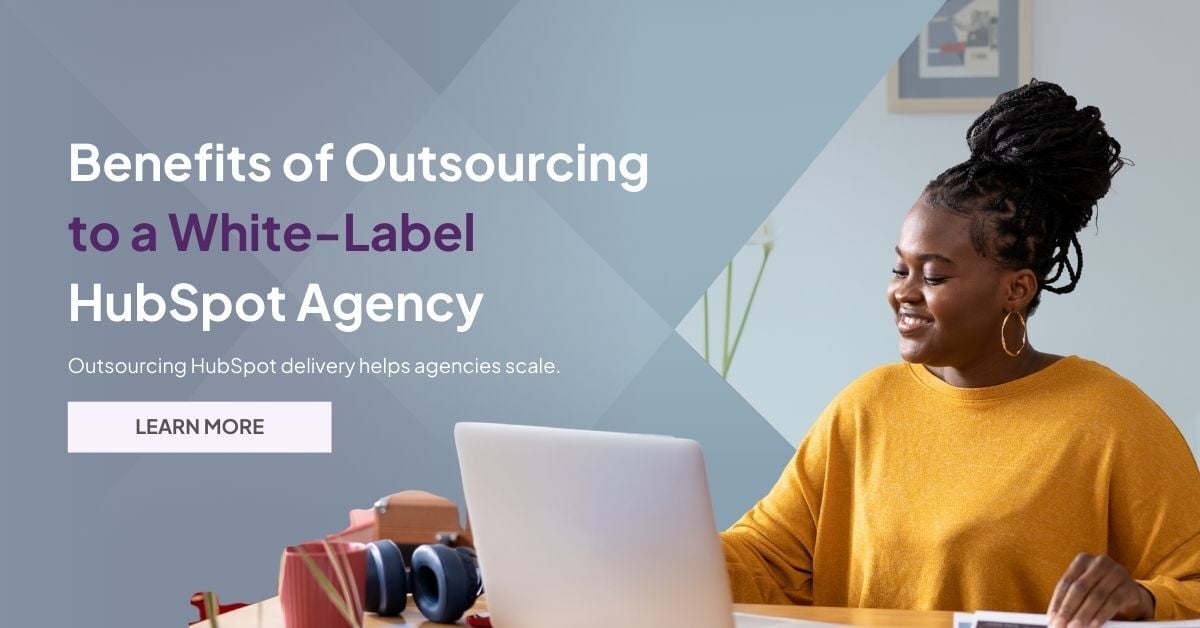Using better open-ended questions will help to:
- Build rapport
- Position yourself as an expert & thought leader
- Uncover pain points & challenges
- Define true need
- Discover goals
- Show the value of your offering
What is an Open-ended Question in Sales?
Open-ended sales questions are questions you a prospect for the purpose of discovery and a way to start a meaningful dialogue. These types of questions are meant to be conversational while uncovering critical details to advance the sales process.
Open-ended sales questions are an important tool for salespeople. They allow them to gain a more in-depth understanding of the customer's needs, wants, and preferences, which can help them tailor their sales pitch to meet the customer's exact requirements.
Why Ask Open-Ended Sales Questions?
1. It helps build trust - By asking open-ended questions, you are building relationships with customers, which can lead to future sales opportunities and lasting business connections.
2. It helps discover pain points - Asking open-ended questions makes it easier for you to build personalized solutions that match your customers' needs and give them the confidence to make the purchase. This will help you better serve them and boost your chances of securing their business.
3. It engages prospects - Open-ended questions force customers to think critically about their requirements and desires. This cognitive challenge piques their interest and encourages them to share their thoughts candidly with you.
Tips for Asking Open-Ended Sales Questions
Here are a few things to keep in mind when asking a potential customer open-ended questions.

- They are prospects, not suspects - So don't interrogate them.
- Keep it natural - Avoid the mechanical list of questions.
- Have patience - Slow the process down & let the prospect do 90% of the talking.
- Be the expert - If you don't know the answer, say you will get them one.
- You're there to help, not sell - So don't drown the conversations with jargon & tactics.
- Be solution-oriented - Position your product or service as the solution.
Avoid Closed-ended Questions
Most sales reps rely on the same three types of sales questions:
- General fact-gathering questions
- Goal assessment questions
- Safe, flattering questions to build rapport
While these types of questions are valuable, they’re more effective when combined with more powerful types of sales questions. Ones that allow the prospect to share their biggest challenges and opportunities.
Open-ended Questions Examples
Asking good open-ended questions early in the sales process is the best way to start a healthy dialogue and assess good fit potential. However, what are the best open-ended questions? Here, we've compiled examples of the top 7 questions to ask:
1. Fact-Gathering Questions
Ask one or two fact-gathering sales questions to gather background, insight, and context that’ll help you learn about how your prospect’s unique business.
/Imported_Blog_Media/fact-gathering-questions-300x216-3.png?width=300&height=216&name=fact-gathering-questions-300x216-3.png)
However, limit these types of questions as they offer little value to the prospect. Asking too many of these questions can damage your credibility and make you sound uninformed.
Examples of fact-gathering questions:
- "What do you consider your priority product or service?"
- "What's the purpose of your website?"
- "What's your Competitive Edge?"
Questions to Avoid
- "How long have you been in business?"
- "What size is your company?"
- "How many people do you employ?"
Why? Because you “should” know the answer to these questions. Don’t let the prospect feel you’re not prepared.
How? At Meticulosity, we use HubSpot CRM. It comes loaded with HubSpot Insights, which auto-loads golden nuggets of prospect data when added to the CRM.
2. Goal Assessment Questions
Goal-assessment questions during the discovery process reveal what the prospect wants to achieve. This might be a personal goal, like a promotion, a functional goal, like meeting a sales goal that quarter, or even a company-wide goal, like increasing customer retention or lead quality.
/Imported_Blog_Media/goal-assessment-questions-300x216-Jun-28-2021-11-02-50-48-PM.png?width=300&height=216&name=goal-assessment-questions-300x216-Jun-28-2021-11-02-50-48-PM.png)
As a salesperson, you’ll show how your product or service will help the prospect achieve their goals.
Example open-ended question: “What do you hope to accomplish in the next year?” You can also ask the prospect to explain projects they’re working on and how those projects help them reach their top-tier objectives.
3. Priority Questions
Priority questions uncover the buyer’s most important goals and challenges. A well-crafted priority question is a great follow-up to a series of goal-assessment questions.
/Imported_Blog_Media/priority-questions-300x216-Jun-28-2021-11-02-59-19-PM.png?width=290&height=209&name=priority-questions-300x216-Jun-28-2021-11-02-59-19-PM.png)
Don’t assume that you know the prospects’ priorities based on past customer experiences, and treat each prospect as unique.
Without using priority questions, you might base your entire sales approach on a false premise.
Examples of priority questions:
- “What does success look like for your sales team?”
- “What would you like to achieve this quarter?”
4. Thought-Provoking Questions
Effective thought-provoking questions reveal new information and ideas to the prospect, potentially re-framing their worldview.
A successful thought-provoking question can help the salesperson establish his or herself as not one of a salesperson, but one of a thought leader, which fosters trust.
Thought-provoking questions begin with phrases like “Did you know…?”, “Have you heard…?”, etc. Share information like surprising statistics, new strategies, and interesting trends to pique the prospect’s interest while building credibility.
5. Hypothetical Questions
Hypothetical questions get the prospect to visualize the future without your solution.
Examples of hypothetical questions:
- “What happens if you don’t achieve [PRIMARY GOAL]?"
- “Would you be concerned if your situation hasn’t changed over the next few months?”
Now, use positive hypotheticals to show how your product or service will improve their business. Ask your prospect what it would be like if, in a few months’ time, their current situation improved because of the positive impact of your product or service.
Positive hypothetical questions allow the prospect to:
- Visualize working with your company
- Seeing a world where your solution plays a key role
- Differentiates your company from the competition
6. Clarifying Questions
These questions help confirm past answers and make sure you’re reaching the right conclusions. It’s best to ask these types of questions right after the prospect has revealed key information or pivotal facts.
For instance, the prospect mentions the company has a problem but has taken no significant steps to solve this problem.
Here, you’d respond by asking them to explain the steps taken. This might involve asking the prospect how long the problem has occurred and whether they’ve seen any measurable results.
7. Objection-Surfacing Questions
Objection-surfacing questions will help you identify any potential issues or concerns your customer may have, and address them head-on.
This ensures that you don't leave any stone unturned and that all bases are covered in order to make the sale happen.
Examples of objection-surfacing questions:
- “What reservations do you have about [specific detail of the product]?”
- “Are you ready to move forward?”
What Happens When There Are Objections?
While exploring the prospect’s concerns can be nerve-wracking (for both parties), it’s important to get any objections out in the open so you can address them head-on. Be transparent and never defensive.
Remember, you’re there to be helpful, so don’t move forward until all objections are clear… otherwise, anything to come from here on out is pointless, and you’ll never close the deal.
If you don’t know the answer to a question or concern… don't just guess! You’ll only risk the prospect of seeing your self-doubt, and you will lose credibility.
Keep in mind that hiring a new vendor/partner can be stressful for the prospect. They simply want to make the best decision in a long-term relationship.
A reply I like to use is, “That’s a great question. So that I can get you the most accurate answer for your situation, would it OK if I connect with my technical team and reply tomorrow?”. They will respect your humility and honesty.
How to Follow Up After a Sales Meeting
After a successful sales meeting, it's important to follow up with your potential customer. This is an effective way of closing the sale and building relationships with your buyers and will help you build relationships and keep your clients happy - something that is key in any business.

Here are some tips for following up after a sales meeting:
1. Send an email or call within 24 hours following the meeting to express gratitude for their time and to discuss the next steps. Include specifics about what was discussed and how you can assist them in reaching their goals.
2. Maintain communication by sending new proposals as soon as possible. Make sure to address any objections or questions raised during the meeting.
This way, you'll know whether they want more information on the product or service being offered, and you'll be able to provide it without having to go into more detail later
3. Be patient! People may have busy schedules or other commitments that prevent them from acting on your proposals right away.
Don't take this personally - many prospective customers aren't ready to make a decision right away. Allow some time for feedback, and then follow up later.
4. Keep track of progress made on any deals struck during the meeting - if anything falls through or needs further discussion, make sure to let them know immediately so that everything can be resolved amicably and without conflict.
Conclusion
Having a logical flow to your questions will yield productive, accurate answers from your sales prospects. By using a better framework of sales questions, your meetings and calls will be like conversations instead of interrogations, which is a win-win.
Remember, your sales questions aim to assess a good fit potential and show thought leadership in the prospects vertical. If you do this, your prospect will include you in their decision-making process.
If you want to learn more about how to close deals, download our free guide below or contact our sales experts.



/Imported_Blog_Media/thought-provoking-questions-300x216-Jun-28-2021-11-02-53-88-PM.png?width=300&name=thought-provoking-questions-300x216-Jun-28-2021-11-02-53-88-PM.png)
/Imported_Blog_Media/hypothetical-questions-300x216-1.png?width=300&name=hypothetical-questions-300x216-1.png)
/Imported_Blog_Media/clarifying-questions-300x216-3.png?width=300&name=clarifying-questions-300x216-3.png)
/Imported_Blog_Media/objection-surfacing-questions-300x216-2.png?width=300&name=objection-surfacing-questions-300x216-2.png)




